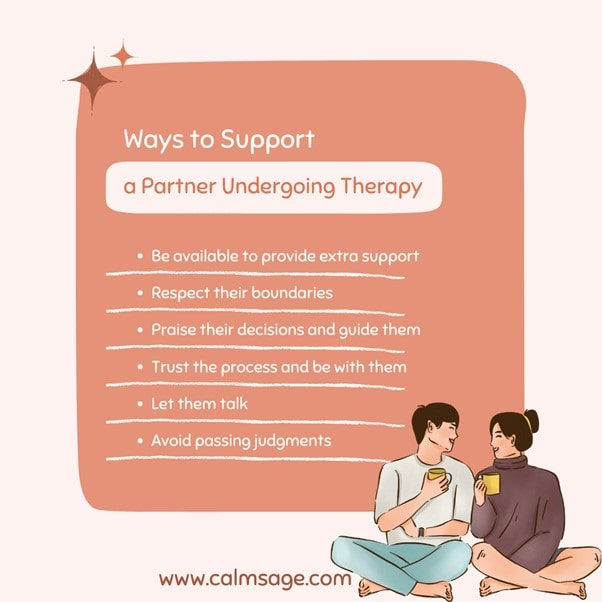6 Ways To Support A Partner Who’s Undergoing Therapy

The content in this article is thoroughly researched and written based on the extensive testing and reviewing by a reviews team and does not reflect the viewpoints of the Calm Sage editorial team. Calm Sage could receive a commission from product purchased mentioned or featured in this article.
If your partner has finally decided to seek therapy, high-five! You and your partner made a great decision. It takes a lot to choose therapy, be in therapy, and reflect on the lessons taught by the therapist. If you want to support your partner throughout the process, it is really important to learn how to support them particularly especially when you are not familiar with the processes of therapy. You don’t have to cheer them up after every session or accompany them, it’s all about supporting them in the right way.
Some days in the therapy session can be optimistic and joyous while others can make your partner feel lost, knowing how to support your partner during therapy sessions can be really helpful. In this blog, I have shared 6 important ways to support a partner who is undergoing therapy.
The enlisted ways can help in supporting your partner, reassuring your partner that they have your back no matter what, and loving your partner unconditionally.
6 Ways to Support a Partner Undergoing Therapy

1. Be available to provide extra support
During some sessions, your partner might feel exhausted, frustrated, or angry, therefore, be prepared to provide them extra support. Intense fallouts during therapy are referred to as “deep work.” It is the part of psychotherapy that might be upsetting for the client. It’s quite important to allow your partner to process their feelings or emotions post-session. Moreover, if your partner is feeling fine after the session, allow them some more time to sink in with the lessons taught by the therapist.
2. Let them talk
If your partner is willing to discuss their discoveries or progress after the session, let them talk, do not act like a therapist, instead, try to be a good listener so that they can tell you how they are seeing themselves on the journey of recovery.
In case, they are not ready to share any instance or practice, do not take it personally, and show them the way to go through the therapeutic process positively. If your partner is not ready to talk about something, do not consider yourself a bad partner, and provide them the emotional space.
3. Respect their boundaries and understand their reasons for distress
Therapy is all about discussing thoughts and feelings in a unique manner and sometimes, it might happen that they are not able to translate the whole therapeutic process in front of you. In such cases, let them talk, Do not focus on getting the details, instead Establish ground rules so that they can keep on examining their journey.
We must respect the privacy of our partners and should avoid trolling them for the information they have shared. If they are not ready to talk, let them know that they have your work and you both will get through it.
4. Continue to praise the decisions that they have made
If their therapy session turned out to be a great session, you can praise the decisions they have made frankly. You guys can sit together and confront each other about the issues or experiences you wish to share. You can value their experiences and cheer them up as a cheerleader so that they can continue choosing healing over struggling. Let them know how brave they are! If your partner is feeling low, do not get caught up in worrying, instead, try cheering them up.
5. Do not expect results immediately or trust the process
Therapy is not a linear process and results can take up some time. If your partner is undergoing therapy for some time, trust the process. The therapist might take some time to unknot the problems of your partner.
Herein, restrain the expectations for some time and let them heal internally. Your partner really needs some trust, openness, space, and understanding to make therapy work for them. Therefore, provide them with the right space and focus on your emotional needs as well.
6. Avoid judgments and competing with the therapist
Therapy can be a lot of deep emotional work therefore, allow some space without passing judgments on your partner so that they can process their feelings or emotions. You might develop feelings of jealousy due to your partner’s and the therapist’s growing relationship.
Remember, it’s for the good, and the therapist-client relationship is a professional relationship. Therefore, do not compete with the therapist and trust the process.
Quick Takeaway: Ways to Provide Emotional Support to the Partner After Therapy Sessions
Some sessions can be joyous and motivational, while some can be really overwhelming for your partner, here’s what you can do to provide emotional support to the partner after therapy sessions:
- Talk when they are ready and make sure to paraphrase what they’ve said so that they can feel heard.
- Whenever they come from a session, provide them a little extra care, compassion, and empathy so that they can understand your feelings too.
- Do not forget to offer physical affection or simple physical gestures to make them feel supported emotionally, physically, and mentally.
- Sometimes, offer love and comfort to remind your partner that you love them and they’ll always have your back.
- After overwhelming sessions, provide them space and check in later, and let them reciprocate on their own.
Wrapping Up!
I know the therapy process can be stressful for you too sometimes. If you need some support, you can also seek it. Support can come in many forms like sharing with your friends, confiding your thoughts in front of someone, or maintaining a journal.
Moreover, if you are not able to cope with your feelings or thoughts, you can also seek help from a therapist. Therapy can help you replace negative thoughts with positive thoughts and healthy coping skills.
To connect with a mental health advisor, click here.

Great for a large network of licensed therapists
-
$60 to $90/week, billed every 4 weeks
-
Therapy via messaging, phone, or live video chat
-
Flexible cancellation at any time
20% off your first month

Great for CBT Based therapists
-
$40/week, billed every 4 weeks
-
Therapy via messaging, phone, or live video chat
-
Specialization for CBT based Therapy
20% off your first month

Best for Treatment Plants
-
$60 to $90/week, billed every 4 weeks
-
Therapy via messaging, phone, or live video chat
-
Flexible cancellation at any time
$100 off your first month with code SPACE
I hope this blog helps you with the best and most effective ways to support a partner who is undergoing therapy. For more such content, connect with us on all social media platforms.
Thanks for reading!




















